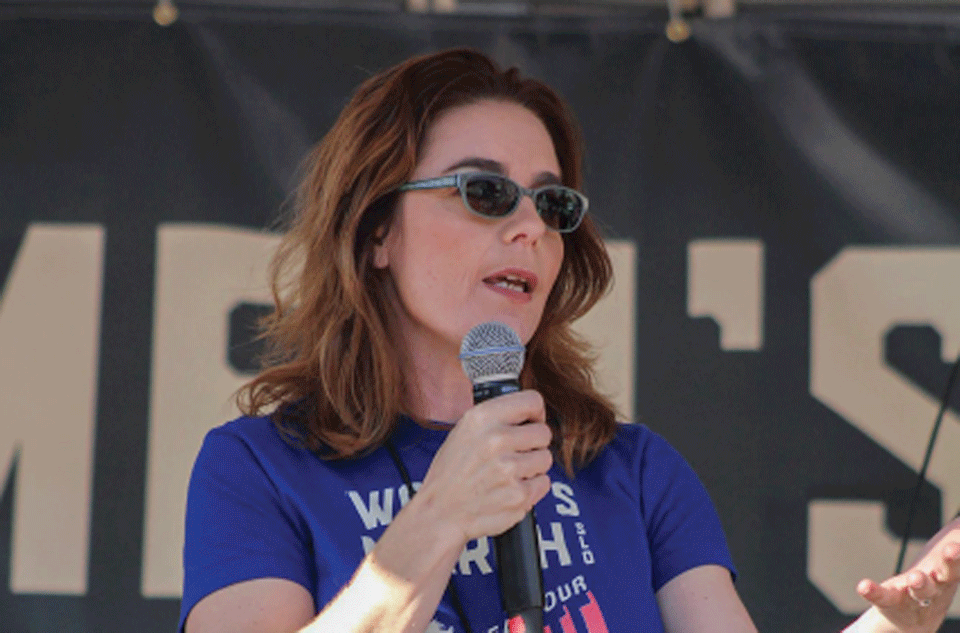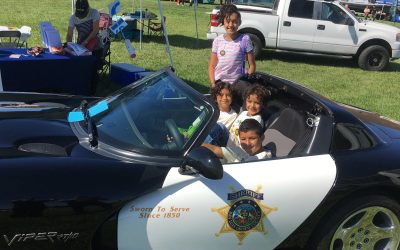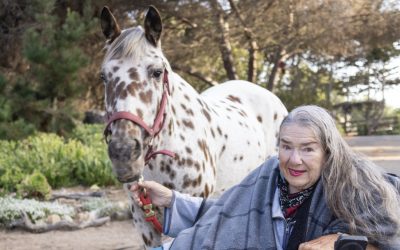Two definitions of the term social justice seem to apply to the principles of Dawn Addis, educator, Women’s March organizer and candidate for the Morro Bay City Council: the concept of fair and just relations between the individual and society; the capacity to organize with others to accomplish ends that benefit the whole community.
Probably before she had even heard the term, Dawn had an intuitive sense of what social justice meant. It was the 80s, and she was attending middle school in Mill Valley, her hometown, “Before the wealth, when it was still a working-class community,” she said. “I saw how kids were treated differently based on skin color, and I felt if I were a teacher I could do it better.”
Each day she witnessed a group of African American students bused in to go to special education classrooms. “As a 12-year-old what stood out was ‘Here comes the bus with African American students going to segregated special education classrooms,’ and it didn’t seem right. It was then I decided I wanted to be a special education teacher.”
Dawn attended Tamalpais High School and then began a ten year higher education odyssey that involved several junior colleges and universities and a year abroad in Madrid. She majored in Spanish, which she knew she would need as a teacher, and double majored in Art Education.
“I ended up with three credentials all wrapped into one program: single subject in Spanish and Art, and Special Education Specialist. And I completed a Masters in Special Education, all at San Francisco State.”
In high school, Dawn took a government class which required presenting a bill at the Mill Valley City Hall. “I presented a bill on legalization of marijuana. It’s funny now, now that’s its legal, but it wasn’t so funny at the time. I also worked on a school district bond measure, knocking on doors to support getting more funding for schools. It was challenging because I had to figure out a valid argument for people who said they wouldn’t support the bond because they didn’t have any children in school.”
While attending Humboldt State, Dawn volunteered at a Women’s Shelter where she went through a six-month training program to guide women from their first phone call for help to a safe house. “It was potentially dangerous work. I learned a lot about the cycle of abuse. I started to learn about feminism, women’s rights, systemic forces that create situations where women are trapped.”
Dawn developed a global awareness of social injustice by following the apartheid situation in South Africa. “Apartheid ended in 1990. I was finishing high school, but I was very aware of what was going on, especially what happened to Steve Biko. It was pivotal to me in learning that there were these larger injustices in the world.”
Dawn and her husband, Marcus, and their oldest son Marcel, who is now a senior at Morro Bay High School, moved to Morro Bay in 2001.
“We moved here for two reasons: for my husband to go to Cal Poly and to live near the ocean. We started visiting, staying in the least expensive accommodations available. Both of us were raised by our mothers in single parent homes and we have a strong sense of fiscal responsibility. On a typically foggy Morro Bay day I drove around and could see the similarities to Mill Valley and knew this is where I wanted to live.”
Her special education background earned Dawn a teaching position at Morro Elementary the last year it was open. “I wanted to work part-time to be with my son, so we were very poor,” Dawn said with a smile. She also taught at Pacific Beach, San Luis Obispo High School, Pacheco Elementary and Laguna Middle School. She is now in her fifth year as a Teacher on Special Assignment at the San Luis Coastal Unified School District as an English Learner Intervention Specialist. A second son, Maceo, was born in 2016.
In my years as a classroom English teacher, I wasn’t keenly aware of the challenges special education teachers faced. That changed when I became the assistant principal in charge of the special education department at San Luis Obispo High School. “It’s a special calling and you get special rewards,” Dawn said. “You learn to pay extremely close attention, to be relentlessly focused on small successes and wins for students who aren’t necessarily on the same academic trajectory as some of their peers. And it’s two jobs in one: you’re a teacher but you’re also focused on legal requirements and compliance, documentation of everything.”
Looking to expand her role in education, Dawn pursued her administrative credential. Marcus, in construction management, was commuting to San Diego because of the shortage of work locally during the economic crisis. “I was working full time, had the two boys, and I was back in school. Marcus was home every other weekend. Going back to school was an idealistic decision, not a practical one. I had taught for thirteen years, been department chair at Laguna. I helped reformat testing and thought if I can have influence from a higher position then I can help create systemic change, a benefit for more kids.” Dawn was hired into her current district position in 2014. “I had learned Spanish. I was teaching at Laguna and one day I was told that one of my students was on hospice. I broke down in tears and got involved immediately. We raised $8000 on Go Fund Me to help support the family. One day I was sitting on their couch translating for the hospice nurse. It drove home for me the need for our families to have someone in their corner.
“The fact that it was me, who decided to teach special education when I was in middle school, who happened to learn Spanish … it all came together at that moment. You don’t know the path you’re on until you arrive. When I saw that the job was available, I thought, ‘Now I have an opportunity to provide services for students throughout the district.’ I got the job the day before I graduated from the credential program. Now I’m proud to work in a system that is focused on providing equal opportunities for all groups of students. Everyone in the district has the same vision. I don’t work in a silo; I work in an ecosystem that is focused on meeting the needs of individual students.”
After the 2016 elections Dawn started thinking about what she had done to create the future she wants. “My career and my life had been about that, but I figured there was more to be done. The things I saw happening in response to the election didn’t fit my persona. I have a hard time targeting and blaming. A backwards view doesn’t get us anywhere. I saw what the Women’s March in D.C. was all about, especially its adherence to Martin Luther King’s principles of nonviolence, of attacking ideas not people. If you don’t want to be in a tug of war, don’t pick up the rope, create a different game, bring people along with you.”
Since the first local Women’s March and rally in January of 2017, which drew 10,000 people, the organization has been involved in twenty events. “After the first march, we received countless emails about the impact it had on participants. One woman wrote that it was the best day of her 32 years of life. We realized that our work wasn’t over. When you have an audience, you have to use your voice for good. You can’t let silence be your voice.” The organization is currently working on getting people out to vote in the upcoming elections.
Perhaps inevitably, Dawn’s journey has led her to one more challenge: direct involvement in local politics by running for the Morro Bay City Council. “There’s a saying that all politics is local. We’ve lived here for almost twenty years. There’s a lot at stake regarding issues like water security, clean energy, the housing crisis, being an affirming and welcoming community, addressing wage disparity and what has happened to the working class, issues that are both national and local. Where are we going with these concerns? We have to create conditions for success.”
Near the end of our interview, Dawn said, “If not me, who? If not now, when?” to explain her altruistic actions throughout her life. There’s much debate about the origins of that quote, but its meaning is clear and points back to the definition of social justice and its embodiment in a dynamic leader dedicated to equality, a positive future and the well-being of our community: Dawn Addis.





